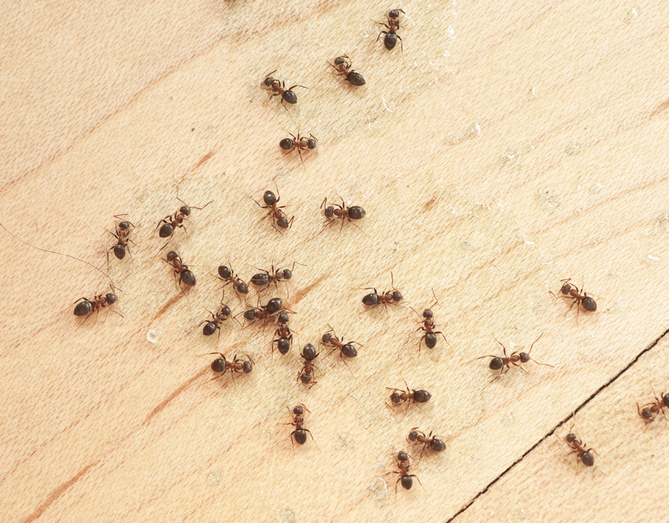How Often Should You Treat for Ants?
How Often Should You Treat for Ants?
The frequency of ant treatment depends on several factors, including the ant species, size of the infestation, and effectiveness of previous treatments. Generally, preventive barrier treatments around a home’s perimeter are recommended every 2-3 months, especially during peak ant seasons. For indoor infestations, baits should be checked weekly and replenished as needed. Spot treatments can be done as and when ant activity is noticed. Regular monitoring and annual assessments by professional services, like Orkin, can provide tailored recommendations to ensure an ant-free home.
How Often Should You Treat for Ants?
Ants are fascinating creatures. In nature, they play a crucial role in the ecosystem, aiding in decomposition, soil aeration, and controlling pests. However, when they invade our homes, they can become a significant nuisance. So, how often should you treat for ants? Let’s dive into the topic.
Understanding Ant Behavior
Before we delve into treatment frequency, it’s essential to understand ant behavior. Ants form colonies, and these colonies can be located both indoors and outdoors. Some species are known to nest indoors, while others might nest outside but enter homes in search of food.
Foraging ants, the ones you often see in a trail, are worker ants searching for food. If you spot these trails, it’s a good indication of an active colony nearby. Observing their patterns can give clues about their nesting location. For instance, if you see winged ants inside your home, it’s a sign that their colony might be indoors.

Save $50
on your first recurring service today with code GET50

GET A PERSONALIZED QUOTE
To protect your home from pests, click here for a free pest control estimate. Our Orkin Pros will create a personalized pest treatment plan for your home or business
or Call (866) 249-0292
Effective Ant Treatment
The key to effective ant treatment is targeting the colony or nest. Simply spraying insecticides on ant trails might kill a few workers but won’t address the root of the problem. In some cases, this can even exacerbate the issue by causing the colony to split into multiple colonies. For optimal results:
- Identify the Ant Species – Different ant species have varied behaviors and preferences. Identifying the species can provide insights into their nesting habits and food preferences.
- Locate the Nest – This is crucial. Treatments are most effective when directed at the nest. If you’re struggling to find it, consider setting up food-lure bait stations. These can trick ants into revealing their nest locations.
- Choose the Right Treatment – There are various treatments available, from liquid sprays and dusts to baits. The choice depends on the ant species, the size of the infestation, and the nest’s location.
So, How Often Should You Treat for Ants?
Factors Influencing Treatment Frequency
- Species of Ant – Different ant species have varied life cycles, nesting habits, and foraging patterns. For instance, carpenter ants, known for damaging wood structures, might require more frequent treatments than sugar ants that are primarily looking for food.
- Size of the Infestation – A larger colony naturally demands more regular attention. If you’re dealing with a massive infestation, you might need to treat the area more frequently until the problem is under control.
- Seasonal Changes – Ants are generally more active during warmer months. Their activity might decrease during colder seasons, but they might still be present indoors, seeking warmth. Thus, treatments might be more frequent in spring and summer compared to fall and winter.
- Effectiveness of Previous Treatments – If a particular treatment method proves to be highly effective, the frequency might decrease. Conversely, if ants reappear shortly after treatment, it indicates a need for more regular interventions.
General Guidelines for Treatment Frequency
- Preventive Barrier Treatments – For homes that have had ant problems in the past, a preventive barrier treatment around the home’s perimeter is recommended. This treatment should be applied periodically, especially during peak ant seasons. Typically, once every 2-3 months is a good rule of thumb, but this can vary based on local conditions and ant activity.
- Indoor Infestations – If ants are nesting indoors, baits can be an effective solution. For active infestations, check bait stations weekly and replenish as needed. Once the infestation is under control, monthly checks might suffice.
- Spot Treatments – If you notice a new ant trail or a small group of foragers, a spot treatment can be effective. These can be done as needed, but always monitor the area for a few days to ensure the problem doesn’t escalate.
- Professional Assessments – It’s beneficial to have a professional pest control service, like Orkin, assess your home annually. They can provide insights into potential risks and recommend treatment frequencies tailored to your specific situation.
Orkin’s Expertise in Ant Control
At Orkin, we pride ourselves on our deep understanding of pests, including ants. Our treatments are tailored to the specific ant species and the unique challenges of each infestation. We use products that are not only effective but also safe for your home environment.
Frequently Asked Questions
Why are ants invading my home?
Ants enter homes for various reasons, including searching for food, shelter, or to establish a new colony.
Are all ants pests?
No, most ant species are beneficial in the landscape. Only a few species are considered pests.
Can I prevent ant invasions?
Yes, regular treatments, especially around the home’s perimeter, can help prevent ant invasions.
How do I know if the ant colony is inside my home?
If you see winged ants inside, it’s a sign that their colony might be indoors.
Are baits effective for ant control?
Yes, baits can be effective, especially for indoor infestations. However, they should be fresh and attractive to the ants.
How does Orkin treat ant infestations?
At Orkin, we use a combination of methods, including baits, sprays, and dusts, tailored to the specific ant species and infestation size.
Is it safe to treat for ants with kids and pets at home?
Yes, Orkin ensures that all treatments are safe for homes with kids and pets.
How can I book an appointment with Orkin?
Simply give us a call, and our experts will be at your service.
Conclusion
While these guidelines provide a general overview, it’s essential to remember that every home and ant infestation is unique. Regular monitoring and being proactive can significantly reduce the need for frequent treatments. And always remember, if in doubt, consulting with professionals like Orkin can provide clarity and ensure that your home remains ant-free.

Find Your Local Branch
To protect your home from pests, click here for a free pest control estimate. Our Orkin Pros will create a personalized pest treatment plan for your home or business

